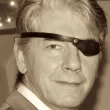Back in my bleak days, when I used to wait tables at LongHorn Steakhouse, a scrounger friend of mine called me about an opportunity. Those were the days of busting my hump for meager tips from ... [+]
Broken Nights, Shattered Glass
Straight out of high school Mick's uncle landed Mick and me second-shift jobs at a textile factory. I asked Mick what the company manufactured. Gigantic rolls of something, he said. From three until midnight his uncle calibrated machines and repaired any that broke, while Mick and I hauled cartons of braid from the loading dock. The big machines sucked in the braid like giants slurping spaghetti, while high above dozens of spools and bobbins intertwined fibers, crisscrossing with one another.
Most nights, after work, we walked straight to the east side and grabbed a booth at the International House of Pancakes. Neither of us owned a car but Mick told the waitresses he drove a Cadillac with AC and power seats. He flirted and teased, and because we were good tippers the girls flirted back.
After we'd downed enough coffee to fuel a tractor-trailer driver's all-night run, we'd hike over to Riverside cemetery and linger by the cliffs, smoking Marlboros and talking nonsense until two or three AM. Sometimes we just gazed at the stars and moon reflecting off the black water.
Mick's sister was buried somewhere in Riverside, but we never went near her grave. Years before I met Mick, his sister had been strangled in her bed, on Easter, while everybody was at church. My mother remembered the whole story from newspapers and TV. She told me the police questioned everybody and in the end arrested nobody.
Mick never talked about any of that time in his life, though one night, while walking past dim porch lights and pitch-black windows, Mick picked up a stone big as a baseball. He repeatedly pretended to throw it, house after house, telling me how nobody in this world should ever be considered safe and protected behind anything fragile as glass.


